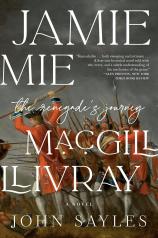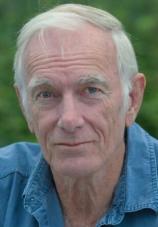Interview: March 2, 2023
Spanning 13 years, two continents, several wars, and many smoke-filled and bloody battlefields, JAMIE MacGILLIVRAY is a thrilling historical and cinematic epic from independent film director, screenwriter, actor and novelist John Sayles. In this interview conducted by Michael Barson, Senior Publicity Executive at Melville House, Sayles talks about his extensive research for the novel, his writing process, the projects he’d love to work on if given the proper resources, the one book that made a huge impression on him as a young reader, and which format would work best for an adaptation of JAMIE MacGILLIVRAY.
Question: JAMIE MacGILLIVRAY is just your sixth novel in a career that goes back to your debut work, PRIDE OF THE BIMBOS, in 1975. Why did you decide to tell this epic historical story in book form rather than make it a film?
John Sayles: First of all, it started as a film script, but we were never able to raise the money to make it a movie. After over 20 years on the shelf, I couldn’t forget the story and knew that using the screenplay as the starting point for a novel would open up all kinds of new and interesting areas in the historical research.
Q: The historical novel as entertainment has been a staple of the book business for the past hundred years and more. Do you have any sense that American novelists have, to some degree, veered away from this category since the heydays of such bestselling authors as Kenneth Roberts, James Michener and Leon Uris?
JS: I think novelists have continued writing those books, but the literary status of the genre has declined.
Q: What were some of the primary differences in the way you conducted your research for JAMIE MacGILLIVRAY versus, say, your acclaimed 1987 film Matewan, which is about the 1920-21 Battle of Matewan in West Virginia?
JS: For my Matewan research, not much was written, but all of it was in English. I was able to find diaries of people who lived in coal camps and worked in the mines. I also talked to older people who remembered the “Matewan massacre” and what life was like in the coal fields in those days.
JAMIE MacGILLIVRAY is a bigger story that takes place over many more years and in many more locations. There is surprisingly good documentation --- lists of men killed and their clan affiliations from the Battle of Culloden, ship manifests from slaving and prisoner transportation voyages, transcripts of several of the trials of rebels. I can read French and found some good accounts of visits to Martinique in the years that Jenny Ferguson spends there. If you keep digging, there is a lot available about the Lenni Lenape and Shawnee raids in the Ohio Valley area during the French and Indian War.
George Washington wrote letters to friends and family that have been preserved. There were even a couple of white missionaries/traders who got to know the Lenni Lenape and their language and wrote about them. For the flavor of the time, I read a lot of Dickens, Thomas Fielding and Tobias Smollett, as well as Robert Louis Stevenson.
Q: JAMIE MacGILLIVRAY is a lengthy novel, perhaps the longest you’ve ever written. Did you ever feel somewhere along the way that it was starting to be too much for you to manage? Or that you might never finish it?
JS: My novel A MOMENT IN THE SUN is over a thousand pages long, so JAMIE MacGILLIVRAY doesn’t seem like that much of a load. Now that I do my finished writing on a computer, I don’t have a pile of written pages that keeps getting taller. I just write the story until it’s over and then do the counting.
Having the historical events to hang a novel on also makes a difference. Knowing that everybody is heading for the Battle of Quebec at the end makes the journey seem very finite. The actual writing didn’t take that long. I spent more time on research than actually writing and alternated the two while I was working. It took about a year.
Q: Your career has included numerous memorable side ventures, ranging from your screenplays for the cult classic films The Howling and Alligator to your Edgar Award for the screenplay of the TV pilot for “Shannon’s Deal” to your acting roles in Eight Men Out and Joe Dante’s delightful Matinee. What is still on your wish list as a project that you’d love to work on if given the opportunity?
JS: Like most filmmakers, I have a handful of stories I’ve written but never been able to raise the money to direct. A Western based on Eugene Manlove Rhodes' book PASO POR AQUÍ and a film set in a Chicago bar on the night of the police riot at the 1968 Democratic National Convention are the most recent candidates. I’m just finishing a novel set at the Carlisle Indian School in 1890-91.
Q: As a young reader, did you have a favorite historical novel that may have paved your way to writing JAMIE MacGILLIVRAY all these years later?
JS: Though it has no “famous” characters, THE RED BADGE OF COURAGE by Stephen Crane made a big impression on me.
Q: If JAMIE MacGILLIVRAY were to be adapted into whatever format you might choose, would you opt to make it a film? An HBO-style miniseries? Or an “Outlander” kind of multi-season TV series?
JS: Practically, it only would be doable as a TV series, where you can amortize the costs of shooting a period story over several episodes or even seasons. I think A MOMENT IN THE SUN would make an even better series.




